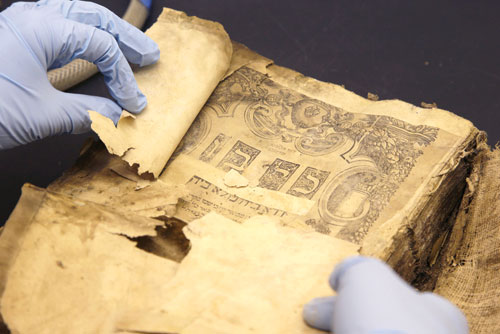.jpg)
(JNS.org) Forty-two groups, led by the Conference of Presidents of Major American Jewish Organizations, recently released a statement calling on the U.S. government to assure that the Iraqi Jewish Archive, which America plans to return to Iraq, would be protected and continually accessible to Iraqi Jewish communities around the world.
During treatment by the National Archives and Records Administration, a Babylonian Talmud from Vienna, dating back to 1793. The Talmud is part of what has become known as the Iraqi Jewish Archive. Credit: National Archives and Records Administration.
The U.S. National Archives is now displaying 24 out of 2,700 Jewish books and ancient documents that were recovered in the basement of the Iraqi intelligence ministry (Mukhabarat) during the U.S. invasion of Iraq in 2003. The exhibit opened Nov. 8 and will run through Jan. 5, 2014.
According to an agreement the U.S. signed with Iraqi authorities, the collection—which became known as the Iraqi Jewish Archive—will be returned to the Iraqi government when its restoration is complete. But the Iraqi Jewish community says the Saddam Hussein government originally confiscated the materials from a synagogue in 1984. Thus the Conference of Presidents called on Secretary of State John Kerry to “consult with representative bodies of Iraq’s expatriate Jewish community and officials before any further decision is made” on the archive.
Stanley Urman, executive vice president of Justice for Jews from Arab Countries (JJAC), previously told JNS.org, “We believe the agreement [to return the archive to Iraq] is based on a flawed premise, that premise being that the archives are the property of the Iraqi government. Our question is—how did they get into the basement of the Mukhabarat?”
A State Department official told JNS.org in an email last month that the department’s “primary concern in bringing the objects to the United States was that they be preserved, conserved, restored and exhibited for the benefit of the Iraqi Jewish community, as well as posterity.”
But JJAC’s Urman said, “We question the willingness and ability of the Iraqi government to do what they purport to do, to preserve the Iraqi Jewish patrimony.”










